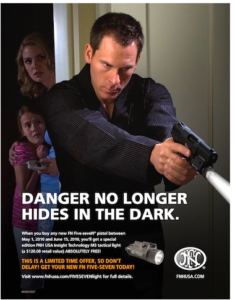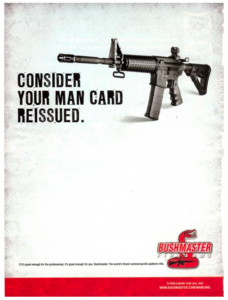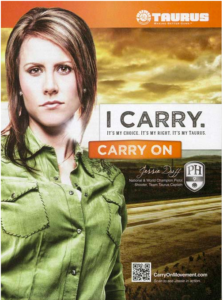On February 14, 2018, a former student opened fire at a Florida high school, fatally shooting 17 people and injuring dozens. As it frequently happens after a tragic shooting, many students, educators, and parents are currently urging lawmakers to tighten access to guns in the United States. Now, this post is not meant to open a debate about gun control; however, as marketers, do we have an ethical responsibility when advertising a product that many believe to be a problem in our society? Is there a way to market guns while being sensitive to the current societal climate?
One of the most frequently used marketing tool for gun manufacturers is the Second Amendment. The Second Amendment is often the center of the gun control debate, and marketers have also used it to sell its products. Politics aside, this is an effective marketing–who can argue with the Constitution? Marketing a product because it is the consumer’s right to own it is personalized and effective in reaching a large group of audience.
Some firearms companies such as Keystone Sporting Arms sell long guns specifically manufactured for children and teenagers, with tagline such as “Start Them Young” and “My First Rifle.” While some may question whether children should have any access–controlled or not–what is interesting here is that guns are marketed as a part of life, even for children, to stay safe and protected from outside harm.

What could be troubling is that organizations such as The National Shooting Sports Foundation specifically target children, with its specific recommendation: “To help hunting and target shooting get a head start over other activities, stakeholders such as managers and manufacturers should target programs toward youth 12 years old and younger. This is the time that youth are being targeted with competing activities” (North, 2016). As marketers, the request by our clients tread on the moral grey area here, especially after a shooting tragedy.
On the other hand, there are some clearly problematic gun advertising. In addition to the Second Amendment, another popular theme is male masculinity.


These advertisements imply that owning a gun equates to male masculinity. Although the FN gun advertisement does not specifically say that owning a gun means manliness, it portraits gun ownership as a necessity to protect his defenseless wife and daughter. In addition to these traditional print ads, gun manufacturers are also enjoying the rise of social media marketing, with accounts such as @GunsDaily with 1.7 million followers. These platforms have given gun manufacturers a new platform to reach their target audiences directly. On the other hand, social media is also fueling the gun control movement, as it is easier to spread its message and organize rallies. Survivors of the recent Florida shootings announced a peaceful march to advocate for tighter gun control, named “March for Our Lives,” supported by the same organization from the widely popular Women’s March (Scanlan, 2018). Both sides of the gun debate have utilized the social media platform to advocate for their causes. However, as marketers, where do we stand? Do we stay out of the gun debate? Or do we have the moral obligation to be sensitive of the social climate and “read the room” when engaging with a product that may be controversial?

References
North, Anna. (February 19, 2016). Marketing Guns to Children. The New York Times. Retrieved from https://takingnote.blogs.nytimes.com/2016/02/19/marketing-guns-to-children/
Scanlan Quinn. (February 18, 2018). Florida teen shooting survivors announce “March for Our Lives” demonstration in D.C. ABC 7 News. Retrieved from http://abc7.com/florida-shooting-survivors-announce-march-for-our-lives/3104170/



7 Responses to Gun marketing–Effective, but ethical?